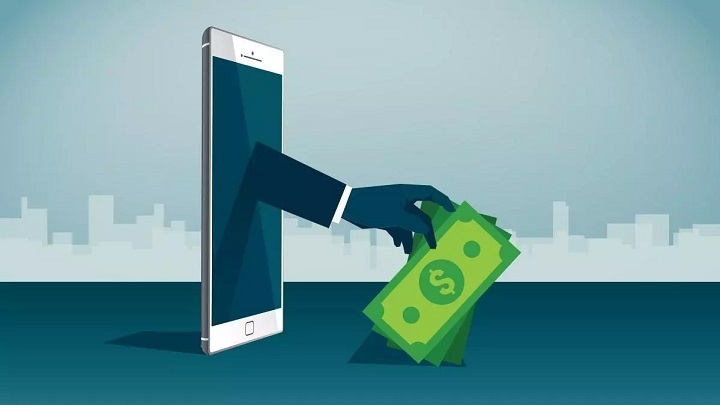
Ten years ago, Nguyen, living on Van Huong Alley in Dong Da district, Hanoi, decided to destroy her old house on an area of 200 square meters to build an office building for lease. She borrowed VND1.2 billion over 24 months from a joint stock bank.
After the construction was completed, Nguyen could not lease the building and did not have money to pay bank debts, VND1.5 billion worth of principal and interest combined.
As advised by some friends, Nguyen borrowed VND1.5 billion from private lenders to pay her bank debts, mortgaging the red book (certificate on land use right) of the house. However, she could not make money to pay the debt, which was why lenders did not give the red book back to her.
As time has elapsed, the debt incurred by Nguyen has soared from VND1.5 billion initially to VND15 billion as a result of compound interest, while she is at risk of losing the building, which she built with her savings.
Nguyen realizes that she made a big mistake when getting involved in black credit.
Black credit has been growing strongly since 2020 as many people have lost jobs because of Covid-19 and faced financial problems. Many families have lost their homes and properties, have become penniless, or have even lost their lives.
Nguyen Thanh Tung, Deputy Director of Hanoi Police, said the black credit interest rate is VND2,000 per VND1 million per day on average. But if usurers realize that debtors need money urgently, they will set an interest rate of VND5,000 per VND1 million per day, or 182.5 percent per annum, or even VND10,000, or 300 percent per annum.
Tung said accessing black credit is one of the reasons behind the increase in crimes of property appropriation and illegal arrest of people, causing social disorder and social security losses.
Black credit acts have become increasingly sophisticated, making it easy for victims to fall into traps. Black creditors make the most of technology to reach everywhere.
They set up apps and accounts, and establish groups on social networks (Zalo, or Facebook) to approach and invite people to borrow money. Companies provide the apps that connect lenders and those who want to borrow money.
The apps can access and collect information about borrowers’ contact lists, history of messages and calls, and information about social network accounts, which they use for debt chasing and other illegal purposes. As they use high technology, it’s difficult to find and fight them.
Yielding to black credit?
Nguyen Van Tat from the People’s Supreme Procuracy said the lack of understanding about the method of calculating interest rates, as lenders don’t give detailed explanations, has pushed borrowers up against the wall. The interest that borrowers have to pay, in many cases, is hundreds of times larger than the principal.
Black credit is also provided under forged contracts. Under the contracts, they buy/sell/lease properties, sell properties and lease them back, or buy products by installment to avoid criminal prosecution. If borrowers cannot pay debts, lenders use the forged contracts to denounce borrowers.
The police said that it’s difficult to discover and handle exploitative black credit acts. Only when there are other criminal violations such as illegal arrest, property appropriation or deliberate infliction of injuries, and if there are denouncers, will the cases be exposed.
HCM City Vice Mayor Ngo Minh Chau said crimes related to black credit are getting complicated. The police have warned that Chinese and Taiwanese may choose the city as a destination to expand online lending.
Meanwhile, lawyers pointed out that despite the sanctions, black credit services are booming. They suggested amending Article 201 of the Penal Code, imposing heavier penalties on usury.
Under the current law, usury is subject to imprisonment from six months to 3 years, which is believed to be a light sanction if compared with the profits the acts can bring.
Economists said black credit still exists in society because people find it difficult to access official bank loans because of complicated procedures, which take time. Many people would rather borrow money at high interest rates than follow the procedures.
They suggested allocating more capital from the State budget to the Bank for Social Policies and creating favorable conditions for the bank to mobilize long-term capital at stable interest rates to expand the number of people who can access loans.
|
According to Major General Tran Ngoc Ha from the Ministry of Public Security (MPS), from late April 2019 to now, the police have discovered more than 1,000 black credit cases with 1,718 subjects, filed charges against 990 suspects in 554 cases, and imposed administrative fines on 593 subjects in 375 cases. Regarding the act of lending money at exorbitant interest rates in civil transactions, 539 cases with 884 people involved were found. Of this, the police filed charges against 541 suspects in 314 cases, and imposed administrative fines on 249 subjects in 153 cases. According to Hanoi People’s Court, the number of cases handled by the court so far this year has increased by 37.5 percent compared with the same period last year. The increase is attributed to the Covid-19 pandemic which has caused many workers to lose their jobs or see their income decrease. Many people do not have enough money to cover basic needs and have to seek loans from usurers. |
Tran Thuy

Technology becomes weapon against black credit
Social networks are now flooded with advertisements for easy loans with low interest rates and simple procedures through apps.

More businesses seek black credit as cash flow plummets
Seventy-one percent of businesses anticipate revenue decreases in 2021, higher than the 65 percent figure in 2020, according to a survey.